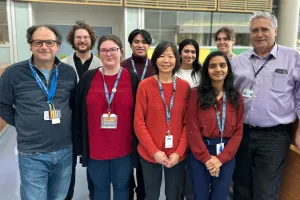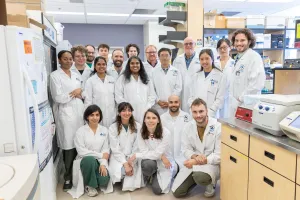First step towards a database linking rare diseases with treatment options
 Dr. Hanns Lochmüller and collaborators have made the first step towards a "treatabolome" - a database that links treatable rare diseases to treatment options. There are over 7000 rare diseases, and a small but growing number are treatable. However, it's impossible for physicians to be experts in every rare disease and keep up with new treatment options. This means effective treatments may be delayed or missed altogether. Dr. Lochmüller and his team think a computer-aided system might be able to help specialists match a patient's rare disease with the latest evidence on how to treat it. The team performed a systematic review of 207 studies on a group of often-treatable neuromuscular conditions called congenital myasthenic syndromes. In collaboration with bioinformatics experts, this is being developed into a proof-of-concept database that will allow potentially treatable genetic variants to be flagged when a patient is diagnosed. They hope to apply this concept to all rare neuromuscular disorders in future studies. Other rare disease groups are interested in applying the same principles. Read more about the study.
Dr. Hanns Lochmüller and collaborators have made the first step towards a "treatabolome" - a database that links treatable rare diseases to treatment options. There are over 7000 rare diseases, and a small but growing number are treatable. However, it's impossible for physicians to be experts in every rare disease and keep up with new treatment options. This means effective treatments may be delayed or missed altogether. Dr. Lochmüller and his team think a computer-aided system might be able to help specialists match a patient's rare disease with the latest evidence on how to treat it. The team performed a systematic review of 207 studies on a group of often-treatable neuromuscular conditions called congenital myasthenic syndromes. In collaboration with bioinformatics experts, this is being developed into a proof-of-concept database that will allow potentially treatable genetic variants to be flagged when a patient is diagnosed. They hope to apply this concept to all rare neuromuscular disorders in future studies. Other rare disease groups are interested in applying the same principles. Read more about the study.
"If a treatment does exist for a rare disease, we want to be able to offer it right at diagnosis. We think a computerized database of treatable rare diseases could help achieve this." -Dr. Hanns Lochmüller, neurologist and senior scientist at CHEO, associate scientist and neurologist at The Ottawa Hospital, professor at the University of Ottawa
Co-authors: Rachel Thompson, Gisèle Bonne, Paolo Missier, Hanns Lochmüller
Source: Emerging Topics in Life Sciences
Funding: EU FP7 RD-Connect, U.K. Medical Research Council, Horizon 2020 Solve-RD
About the CHEO Research Institute
The CHEO Research Institute coordinates the research activities of CHEO and is affiliated with the University of Ottawa. Its three programs of research are molecular biomedicine, health information technology, and evidence to practice research. Key themes include cancer, diabetes, obesity, mental health, emergency medicine, musculoskeletal health, electronic health information and privacy, and genetics of rare disease. The CHEO Research Institute makes discoveries today for healthier kids tomorrow. The CHEO Research Institute's work in genetics has been supported by Genome Canada, CIHR and the Canada Foundation for Innovation. For more information, visit www.cheori.org.
The Ottawa Hospital: Inspired by research. Driven by compassion
The Ottawa Hospital is one of Canada's largest learning and research hospitals with over 1,100 beds, approximately 12,000 staff and an annual budget of over $1.2 billion. Our focus on research and learning helps us develop new and innovative ways to treat patients and improve care. As a multi-campus hospital, affiliated with the University of Ottawa, we deliver specialized care to the Eastern Ontario region, but our techniques and research discoveries are adopted around the world. We engage the community at all levels to support our vision for better patient care. See www.ohri.ca for more information about research at The Ottawa Hospital.
University of Ottawa: --A crossroads of cultures and ideas
The University of Ottawa is home to over 50,000 students, faculty and staff, who live, work and study in both French and English. Our campus is a crossroads of cultures and ideas, where bold minds come together to inspire game-changing ideas. We are one of Canada's top 10 research universities--our professors and researchers explore new approaches to today's challenges. One of a handful of Canadian universities ranked among the top 200 in the world, we attract exceptional thinkers and welcome diverse perspectives from across the globe. www.uottawa.ca
Media Contact
Aynsley Morris
Director of Communications, CHEO Research Institute
E: amorris@cheo.on.ca
T: 613-737-7600 x 4144
M: 613-914-3059
Learn more about:
The Ottawa Hospital is a leading academic health, research and learning hospital proudly affiliated with the University of Ottawa and supported by The Ottawa Hospital Foundation.


